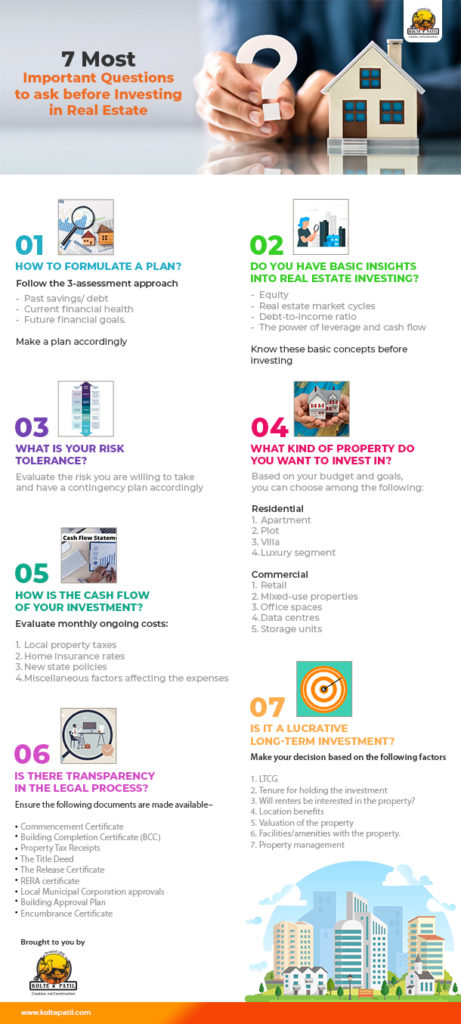
7 Most Important Questions to ask before Investing in Real Estate
Real estate investment is a must in any investment portfolio.
Here are a few questions to assess before making an informed decision.

Click on Image to View Larger
1. How to formulate a plan?
The simplest way to make an investment plan is to follow the 3-assessment approach.
- Past savings/ debt
The first step is to note down your savings so far. This will also show your history of expenses and help you alter your spending pattern.
This segment should also include your debts that affect your future finances.
- Current financial health
After noting your savings, you can evaluate your present financial situation based on your monthly income, cash outflow in debt repayments and miscellaneous monthly expenses. Your financial health will determine the right time for you to make a real estate investment in India.
- Future financial goals
Finally, jot down your financial goals, including your other investment plans, children’s education, healthcare, insurance, miscellaneous purchases, and expected salary increments.
You get an estimation of the loan amount & tenure, EMIs, how long you want to hold the investment, and effects on monthly expenditures.
Real estate investing also needs to consider extrinsic factors–
- Best city to invest in real estate in India.
- Best real estate investment in India according to state policies and rental structure.
- The upcoming infrastructural developments in the area.
2. Do You have basic insights into real estate investing?
To understand how to invest in real estate, one must know a few basic terminologies:
- Equity— difference between your home’s current value and the mortgage amount you owe.
- Real estate market cycles— recovery, expansion, hyper supply, and recession are its 4 four phases.
- Debt-to-income ratio— a percentage of monthly income for debt, mortgage, repayments, etc.
- The power of leverage and cash flow— using borrowed capital to increase ROI.
3. What is your risk tolerance?
Every investment needs a contingency plan. Since real estate is a massive investment, you need to evaluate your risk tolerance in case of a market crash. Other risks based on unforeseen circumstances include:
Risk of the government seizing property.
Risk of natural disaster.
The above plan gives you an estimation of what your lower limit of loss can be.
4. What kind of property do you want to invest in?
The best part of real estate investments is that you get various options based on your budget and financial goal. Many real estate investors prefer flipping property which requires minor cosmetic alterations and putting it back on the market. Some of the best real estate investments for long-term/property flipping are–
Residential:
- Apartment: Best for budget-friendly and cost-effective investment.
- Plot: Benefit of customising the house as per your preference.
- Villa: Best for house flipping.
- Luxury segment: Luxury residential properties are a hot commodity for better ROI.
Commercial:
- Retail: Rental returns are higher than any other property.
- Mixed-use properties: Better prospects in ROI with a wide spectrum of buyers.
- Office spaces: Best for diversifying and spreading portfolio risk.
- Data centres: With cloud computing gaining huge traction, spaces for data centres are profitable investments.
- Storage units: Industrial warehousing spaces are in high demand in the market.
5. How is the Cash Flow of your investment?
Cash flow in real estate is the income from the property (rentals) and the amount spent on property management. With a wider profit margin, the positive cash flows can be used for maintenance, thus making your investment self-sustainable.
However, one must evaluate the following monthly costs to ensure positive cash flow.
- Local property taxes
- Home insurance rates
- New state policies
- Factors affecting the expenses: infrastructure, security, demography, connectivity, etc.
Negative cashflows occur when your property is unused for a prolonged period, or the rental structure is unfavourable to your invested amount. Evaluate such risk patterns to avoid further losses.
6. Is there transparency in the legal process?
An ethical real estate company will always maintain transparency with their customers in contracts, legal documents, compliances, etc. Kolte-Patil Developers is one such reputed brand that makes your purchase easier and consults with the best-suited homes from their extensive catalogue of projects across Pune, Bangalore, and Mumbai.
With recent policy upgrades, millennials investing in real estate should verify the following documents before finalising the purchase.
- Commencement Certificate
- Building Completion Certificate (BCC)
- Property Tax Receipts
- The Title Deed
- The Release Certificate
- RERA certificate
- Local Municipal Corporation approvals
- Building Approval Plan
- Encumbrance Certificate
PRO-TIP: If you suspect legal discrepancies, hire a legal real estate counsellor and make an informed decision.
7. Is it a lucrative long-term investment?
Lastly, you need a projected valuation for your investment. The best solution how to determine if real estate is a good investment, assess the following parameters:
- LTCG– check the historical patterns of appreciation in the property value.
- Tenure for holding the investment– what is the best time to exit a favourable investment?
- Location benefits– whether the site is conducive for residents/employees
- Valuation of the property– Real estate investments in Bangalore, Pune, and Mumbai are preferred due to their high HPI (house price index). Check whether the average property value of your location is on an upward trajectory.
- Facilities/amenities with the property– millennials prefer projects equipped with quality amenities for wholesome living.
- Property management– maintenance helps with longevity.
- Will renters be interested in the property? – modify your property based on your target customers.
CONCLUSION:
For the best real estate investment in Mumbai, Pune, and Bangalore, the overall solution for the above questions is to invest with Kolte-Patil Developers, who offer the best deals for investors. Browse our website for an array of investment prospects— from commercial, retail, and residential to the most luxurious apartments in Mumbai, Pune, and Bangalore.






